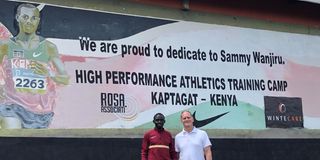Spiritual run: US professor draws parallels between religion, athletics in Kenya

Robert Carle, a professor of theology and journalism at King’s College, New York, with former Chicago, Boston and Amsterdam Marathon champion Lawrence Cherono in Kaptagat last week.
What you need to know:
- The professor adds that three-quarters of these Kenyan champions come from the Kalenjin ethnic minority, which has only six million people.
- The Kalenjin live in Kenya’s Rift Valley.
- Iten, a town which sits on the edge of the valley at 7,000 feet above sea level, is nicknamed “the home of champions.”
When Robert Carle’s two teenage sons expressed interest in training in Kenya for their budding marathon careers, he saw a good chance to explore a topic that he had been mulling over for some years - the role faith plays in the lives of the world beating Kenyan athletes.
The professor of theology and journalism at King’s College, New York, recently took a trip to Kenya and stayed in Iten, talking to some of these athletes to help him understand how they wove their faith into their running and how it keeps them anchored in life.
Carle is curious as to why, since 1988, some 20 out of the 25 first-place men in the Boston Marathon have been Kenyan; Of the top 25 male record holders for the 3,000 metres steeplechase, 18 are Kenyan; Eight of the 10 fastest marathon runners in history are Kenyan, and the two outliers are Ethiopian; The fastest marathon time ever recorded was Kenyan Eliud Kipchoge’s 2018 Berlin Marathon.
The professor adds that three-quarters of these Kenyan champions come from the Kalenjin ethnic minority, which has only six million people.
The Kalenjin live in Kenya’s Rift Valley.
Iten, a town which sits on the edge of the valley at 7,000 feet above sea level, is nicknamed “the home of champions.”
He says American journalists have been fascinated by Kalenjin runners for decades, and their explanations for Kenyan dominance in running has included training, culture, biology, and diet.
The spiritual lives of the runners have received scant attention in the coverage of Kalenjin runners.
The vast majority of these runners were raised in either Pentecostal or Roman Catholic households, and they frequently attribute their success to the discipline and support that their religious faith has given them.

Aspiring marathon runners Zachary and Caleb, sons of Robert Carle, a professor of theology and journalism at King’s College, New York, pose for photographs at Central Park, New York City. They will be visiting Kenya next month to train with leading elite marathon runners.
“Marathon runners are national heroes in Kenya, and their religious beliefs commit them to use their fame and wealth to serve their communities.
“Wesley Korir, for example, won the 2012 Boston Marathon. He used his earnings to start a foundation that supports 2,000 farmers and pays for 300 children to go to school,” he told this writer in an interview hours after getting back to Nairobi from Iten.
While in the town famed for identifying, nurturing and exposing the talent of many athletes, Carle, who is a contributor to the religion new website ‘Religion Unplugged’ spoke to star athletes Lawrence Cherono, Mary Keitany as well as some religious leaders who have watched these world beaters train and go ahead to win on the international stage.
Carle writes in www.religionunplugged.org: “Lawrence Cherono, winner of the 2019 Boston and Chicago marathons, said that journalists never ask him about his Christian faith.
“And when he brings it up in interviews, journalists quickly change the subject.
“The vast majority of these runners were raised in either Protestant Christian or Roman Catholic households, and they frequently attribute their success to the discipline and support that their religious faith has given them.
“Cherono told me that from a very early age, he attended the Africa Inland Church. He was spiritually formed in a church that taught him to give back to society.
“Now that he has achieved fame, he is in the process of setting up the Lawrence Cherono Foundation to fund the digging of wells in his hometown, which lacks clean and abundant water.”
On her part Keitany, who won the 2014, 2015, 2016 and 2018 New York City marathons, said she and her husband, Charles Koech, have helped fund and build the Mary Keitany Shoe4Africa School in Mary’s hometown, Torokwonin, Baringo County.
“Mary had to drop out of school work as a house girl when she was a teenager. She wants to help other children in her hometown avoid a similar fate,” Carle says.
John Njoroge Miaka, winner of the Madrid Marathon in 2000 and the Valencia Marathon in 2001 says Kenya is not like Europe or America.
“Christianity holds us up. We expect miracles. Even runners who don’t go to church carry small Bibles around with them and read their Bibles for inspiration. They trust in the God of the Bible.”
The Rev. David Nganga is the lead pastor of the Africa Inland Church Fellowship in Eldoret, Kenya.
He has had several elite runners in his congregation. He recognizes them in worship services, and during races, his congregation prays for the runners.
He said that Kenyan churches must become as deliberate about pastoral care after the games as they are before the games.
“Kenyan athletes who come home as winners face a myriad of immense challenges.
“In rural parts of Kenya, a rich person is expected to help not only his or her family and his friends but also anyone lacking money for food, medicine or rent.
“Successful runners are plagued by requests from needy people.
“They are also expected to appear at political rallies, at events by business owners to inaugurate shops and at church fundraisers.
“Such pressures can drive Kenyan runners to hide themselves in training camps or to move to Nairobi, where they can live anonymously,” he said.



